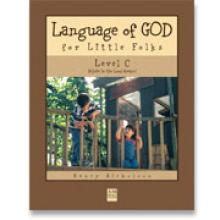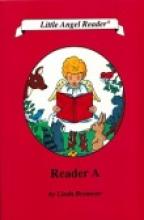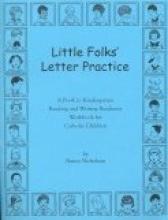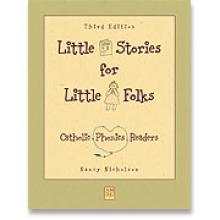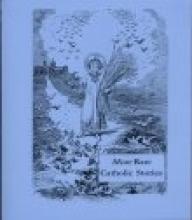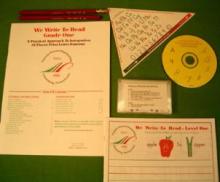Language Arts
Language of God for Little Folks (Level C)
Language of GOD for Little Folks - Level C, is Catholic Heritage Curricula’s grammar program designed for the third or fourth grader. It is a complete program in a spiral bound workbook and does not require any additional text or teacher’s manual. The program focuses on gradually building language skills. These skills are very naturally presented within the context of the Catholic faith. Topics covered are sentence parts, nouns, verbs, adverbs, adjectives, pronouns, commas, apostrophes, tense, and subject- verb agreement. These topics are all covered in a slightly more challenging manner than in the previous levels.
We have been using CHC’s Language of God program for two years. It presents the information in a regular and comprehensive manner without being needlessly repetitive. Each topic is introduced and the child has the opportunity to practice the necessary skills with reviews included every few lessons. We normally supplement the exercises by discussing the concepts as they apply to our literature and writing assignments. The program is designed to be easy on the teacher and easy on the student without sacrificing quality (speaking plainly, it is easy for me to call out, “Start your grammar.” while attempting to redirect a mischievous toddler and my eight year old begins the lesson joyfully). Furthermore, it teaches grammar while focusing on the ultimate goal of salvation. In the very first lesson it is necessary to read through and discuss several passages from the Gospel. This is a very balanced program for the Catholic homeschooler.
Lingua Mater
This is a complete English program written for 7th grade, but can easily be adapted for 6th and 8th graders as well. Although it is written to be used in one year, the author has given details of how it can be broken down into a two year program.
Margot Davidson has taken beautiful Literature pieces, paintings and poems, and incorporated them into a program to teach English. By using narration, copy work, Literature analysis, discussion, and grammar, your child will come away with an understanding of how sentences, paragraphs, poems and stories are put together. The approach is gentle yet the writing assignments require higher order thinking than any comparable English program on the market. Lingua Mater would be a wonderful next step for those using Primary Language Lessons, Intermediate Language Lessons or Stories with a View. Lessons are perfect for your Middle School child and the text is a wonderful preparation for the High School years which will require more in-depth analysis and writing.
The student book is broken down into four Units and each Unit has nine weeks. The student book is not meant to be written in, but there is permission for you to photocopy for your own family. (Or you can purchase the supplement from Hillside Education, which has all the work done for you, photocopies would cost you much more.)There are rubrics to help you determine your child's writing abilities and checklists for your child to use himself to evaluate whether he has completed his writing assignments accordingly. The teacher's guide is wonderful and includes examples of the types of answers you are looking for from your child's grammar and discussion work.
Hurray to Mrs. Davidson for putting out a product which will be a treasure to Catholic home school parents for years to come!
Little Angel Readers
The Little Angels Series are four soft cover readers that teach all phonics sounds using word drill pages and phonetic stories. It teaches letter-sound relationships systematically, beginning with the easiest letter sounds. The word drill pages provide practice in decoding words containing the letter sounds. The stories with phonetically-controlled vocabulary follow each word drill page. They provide practice in decoding words in context and build comprehension skills. The stories are about Catholic family life, Bible stories, and Saint stories as well as fables and folk tales. The illustrations are well done and many are in color. Review pages are provided at regular intervals.
The workbooks are consumable and accompany the readers. They reinforce the lessons from the readers with exercises in phonics, vocabulary, reading comprehension and handwriting.
The Teacher's manual provides detailed lesson plans and suggestions for related activities. The manual provides daily lesson plans for teaching the entire series. The lessons cover reading readiness, phonics, listening skills, vocabulary, handwriting, comprehension and spelling. There are also multi-sensory activities included to accommodate children who have different learning styles. The pace is very flexible so you progress at *your* child's speed. The manual also contains progress test after each review to assess how well your child is doing.
Sequence of Phonics Reader A - Consonants, short vowels Reader B - final blends, -ed, -ing, long vowels, two-syllable words Reader C - Beginning consonant blends, Y as a vowel, Consonant digraphs, R- controlled vowels Reader D - vowel digraphs and diphthongs, soft c and g, Irregular sounds and spellings
The author holds a MEd in Reading from the University of Missouri-St Louis and is certified in Learning Disabliites. She has six years classroom experience and nine years experience in home education.
I am using the Little Angels in place of the MCP phonics that Seton sends with their First Grade Curriculum. If you need something for Kindergarten, with beginning sounds and letter recognition, I highly recommend Seton's Kindergarten Phonics for Young Catholics. I have had great success with the Little Angels series with my daughter who is now finishing Reader D. She is 8 years old. My son who is 7, could not wait to start the readers and is also on Reader D. The Little Angels Phonics Series is really a wonderful tool for teaching your children to read.
Little Folk's Letter Practice
We reviewed Little Folks' Letter Practice. We found this to be very simple. For our child this was too easy for K level. It is basically for the Pre-K level. It has pages that are of coloring book quality. We photo copied the pages to make them easier to write on with a pencil. The letters of the alphabet are one to a page with a trace and write page following each letter. The pictures with each letter try to complement our faith. The introduction offers creative advice for the use of the book. The last 5 pages of the book encourage the child to sound out words. There are four or five possible words in a column. A blank has been left in front of each word, such as 'an'. Pictures to the possible word are in the right hand column to assist the child in the discovery of the word. The child will need to sound out the word in the column look at the pictures such as 'man' and write the consonant. There are no difficult words to sound out. All words are only three letters such as 'man', 'cat', 'mop', etc. This is a nice book for becoming familiar with the alphabet.
Little Stories for Little Folks
The Parent's Guide offers steps to prepare your child to read by using the enclosed flashcards (printed on card stock) to gain letter and sound recognition and then proceeding to work on pre-reading blends (with the pre-reading sound blend sheets that are included in the program and printed on card stock). After these steps are accomplished, the child will be ready to proceed to the phonics readers. The parent's guide also offers discussion questions to help your child get more out of each story.
There are four sets of readers, each set being identified by its own color. The booklets and flash cards come as an 8 1/2 x 11 pad. Each booklet starts out as a regular-sized piece of paper which you fold into four to form a child-sized booklet.
 Level 1 contains 15 booklets. The story titles are: "At Mass", "Stop! Hot Pot!", "Sad Nip", "Mud on the Rug", "The Hot Pup", "Mom Gets Help", "The Rat", "Little Ann", "Bat the Ball", "Funny Ann", "The Campers", "God With Us", and "Messy Room".
Level 1 contains 15 booklets. The story titles are: "At Mass", "Stop! Hot Pot!", "Sad Nip", "Mud on the Rug", "The Hot Pup", "Mom Gets Help", "The Rat", "Little Ann", "Bat the Ball", "Funny Ann", "The Campers", "God With Us", and "Messy Room".
This set starts with simple words such as "pat" and "sat" and progresses slowly to more complex words like "tent", "small" and "under".
 Level 2 contains 10 booklets. The story titles are: "Dad's Cake", "Mrs. May is Sick", "Mike's Bike", "Visit the Sick", "We Hope to See the Pope", "The Little Goat with No Sense", "The Cold Rain", "Feed the Hungry", "The Tease", and "Noon Potluck."
Level 2 contains 10 booklets. The story titles are: "Dad's Cake", "Mrs. May is Sick", "Mike's Bike", "Visit the Sick", "We Hope to See the Pope", "The Little Goat with No Sense", "The Cold Rain", "Feed the Hungry", "The Tease", and "Noon Potluck."
This level starts with words like: "cake" and "taste" and progresses to words like "salad", "baby" and "table".
 Level 3 contains 10 booklets. The story titles are: "Ann Cleans the Church", "Blessed Sacrament", "St. Paul", "A Toy for a Boy", "At the Beach", "The Found Rosary", "Run the Race", "School, Where?", "The Quake", and "I Didn't Know".
Level 3 contains 10 booklets. The story titles are: "Ann Cleans the Church", "Blessed Sacrament", "St. Paul", "A Toy for a Boy", "At the Beach", "The Found Rosary", "Run the Race", "School, Where?", "The Quake", and "I Didn't Know".
The starts with words like "kneel" and "holy" and progresses to words like "receive" and "neighbor".
 Level 4 contains 10 booklets. The story titles are: "The Bright Star", "The Caught Calf", "Mr. Brown's First Holy Communion", "Kim's Adoption" (in two parts), "In the Match Box", "Badge Fudge", "Squirt", and "Our Lady's Secret".
Level 4 contains 10 booklets. The story titles are: "The Bright Star", "The Caught Calf", "Mr. Brown's First Holy Communion", "Kim's Adoption" (in two parts), "In the Match Box", "Badge Fudge", "Squirt", and "Our Lady's Secret".
This level starts with words like: "night" and "follow" and progresses to words like "cheerfully" and "enough".
Set contains:
22 page softcover parent's guide, set of 45 booklets, 47 flashcards
Copyrights 1998/2004
Donated for review by Catholic Heritage Curricula
Little Stories for Little Folks
4 levels, 45 stories to fold into booklets, bound Parents' Guide, Silly Willy Sentences activity, and Catholic flashcards on stiff cardstock
More Rare Catholic Stories and Poems
This second volume of stories is very similar to the first. Volume 2 is a larger book (7" x 8") and geared for slightly older children.
Pamela Walks the Dog
My two reading-age children (ages 6 and 8) so enjoyed the punch line that they fought over who would be the first one to read the story to Daddy. As evidenced from the sticky fingerprints on every page, my younger children (ages 2 and 4) have been poring over the book as well. The story could be easily read by a younger reader who knows most of the phonograms (the story includes a few "challenging" words, such as "thought" and "would").
Peterson Directed Handwriting
Most of the booklets are stapled softcover, with the exception of the Preschool / Kindergarten ABC - 123 book, which is spiralbound.

